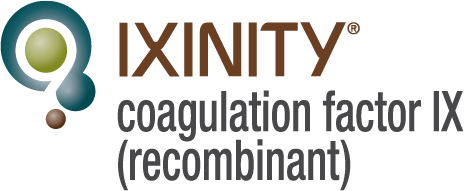No factor IX inhibitors developed
Clinical trial* experience of previously treated patients


No patients developed factor IX inhibitors when switching to IXINITY® in a clinical trial1
The body may form inhibitors to any factor IX product. Patients should be monitored for the development of factor IX inhibitors if expected factor IX activity plasma levels are not attained, or if bleeding is not controlled with the recommended dose of IXINITY.1

No drug-drug, drug-food, or other interactions with factor IX products are known2
* In adolescents/adults, the efficacy (n=68) and safety (n=77) of IXINITY have been evaluated in a prospective, open-label, uncontrolled, multicenter trial in which previously treated patients (PTPs) between 7 and 64 years of age received IXINITY in either a routine or on-demand regimen, including 55 patients with more than 50 exposure days and 45 of those patients with more than 100 exposure days.1
In children, the efficacy and safety of IXINITY have been evaluated in a prospective, multicenter, multicountry trial in 21 PTPs (<6 years and 6 to <12 years) who received once or twice weekly prophylaxis treatment with IXINITY for a mean of 159 exposure days.1
†No subjects developed inhibitors to factor IX when administered IXINITY in a clinical trial, including 74 patients with more than 50 exposure days and 61 patients with more than 100 exposure days to IXINITY.1
Established safety profile
Headache was the most common adverse reaction—observed in 2% (2/98) of patients in a clinical trial1
7% (7/98) of patients reported a total of 15 adverse reactions out of 12,952 infusions of IXINITY during the clinical trials of previously treated patients (PTPs), which included 11 subjects 12 to 18 years of age and 21 subjects <12 years of age.1
| Adverse reaction | Number of subjects | Number of events |
|---|---|---|
| Headache | 2 | 5 |
| Apathy | 1 | 1 |
| Asthenia | 1 | 1 |
| Depression | 1 | 1 |
| Dysgeusia | 1 | 1 |
| Hemophilia (ie, lack of efficacy) | 1 | 1 |
| Hypersensitivity | 1 | 1 |
| Influenza | 1 | 1 |
| Injection site discomfort | 1 | 1 |
| Lethargy | 1 | 1 |
| Rash pruritic | 1 | 1 |
Manufacturing process
The IXINITY manufacturing process is designed for product purity and safety
- Third-generation‡ factor IX treatment
- Purified by a chromatography purification process
- Employs a validated 3-step viral inactivation/removal process
- Solvent/detergent treatment
- Chromatographic step
- Nanofiltration
- Utilizes a validated HIC step to reduce the presence of CHO proteins
Working Cell Bank to Harvest Concentration
Viral Inactivation
Chromatographic Purification
Hydrophobic Interaction Chromatography
Viral Filtration
Formulation and Filtration
Finished IXINITY®
HIC = Hydrophobic interaction chromatography; CHO = Chinese hamster ovary.
‡Third-generation product: Defined by the National Hemophilia Foundation Medical and Scientific Advisory Council as recombinant factor IX (rFIX) produced in Chinese hamster ovary cells; no human or animal plasma-derived proteins are used in the manufacturing process.
ADDITIONAL WARNINGS AND PRECAUTIONS
Hypersensitivity reactions, including anaphylaxis, has occurred with IXINITY. Discontinue use of IXINITY if hypersensitivity symptoms occur, and initiate appropriate treatment.
Thromboembolism has occurred with IXINITY (eg, pulmonary embolism, venous thrombosis, and arterial thrombosis).
Patients should be monitored for factor IX activity levels by the one-stage clotting assay to confirm that adequate factor IX levels have been achieved and maintained, when clinically indicated.
References: 1. IXINITY [coagulation factor IX (recombinant)]. Prescribing information. Chicago, IL: Medexus Pharma, Inc.; March 2024. 2. Data on file. Chicago, IL: Medexus Pharma, Inc.



